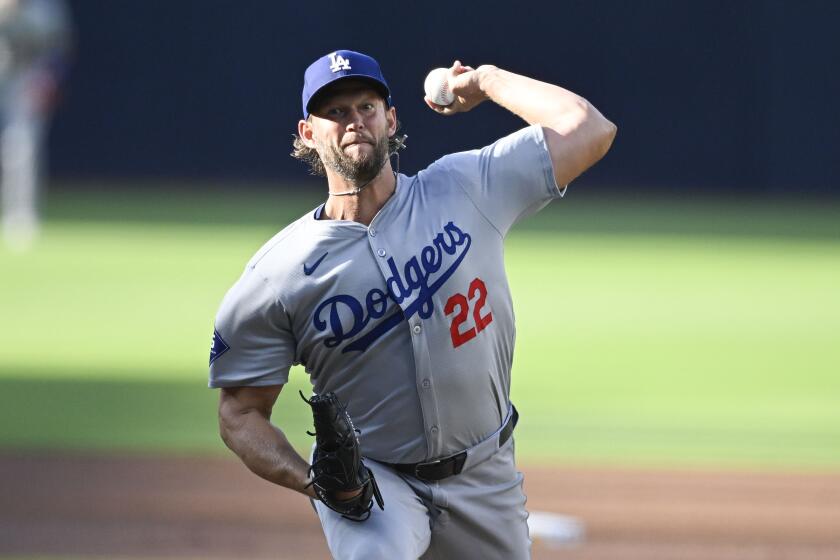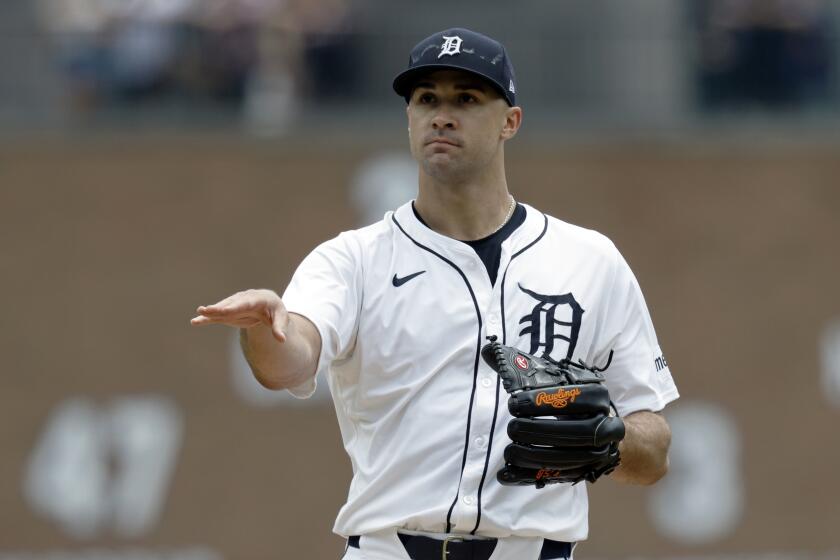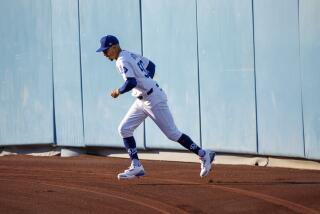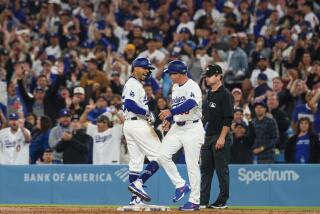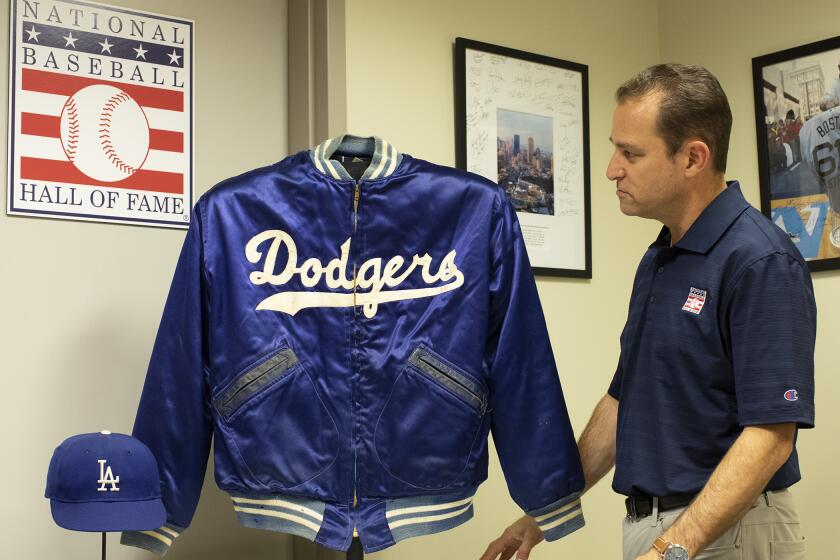Column: Mookie Betts’ comeback from a broken hand is almost done. Where do the Dodgers play him?
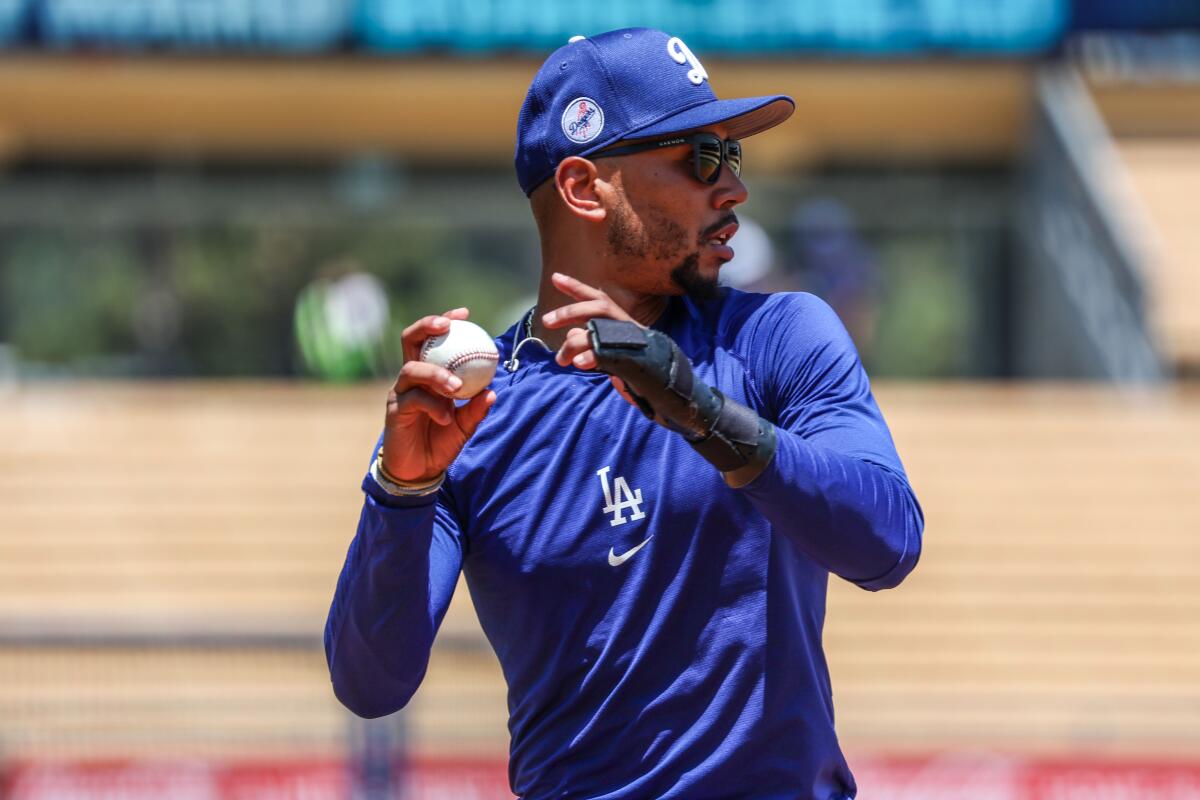
- Share via
SAN DIEGO — His versatility reflects his selflessness as much as it does his athletic gifts.
One of the greatest defensive right fielders in baseball history, Mookie Betts moved to second base last year because the Dodgers needed him to. He moved from second base to shortstop this year because, once again, the Dodgers needed him to.
Most superstars wouldn’t be as understanding. Most superstars wouldn’t be able to play as wide a variety of positions if they wanted to.
“He’s one of the best people and teammates I’ve ever been around,” manager Dave Roberts said.
Now, as Betts nears his comeback from a broken hand, the Dodgers could be making another request that tests his capacity for self-sacrifice.
After losing to the San Diego Padres, the Dodgers suddenly find themselves in a compelling division race.
They could be asking him to return to right field.
Roberts didn’t say they would. General manager Brandon Gomes didn’t, either. But look at the players the Dodgers picked up before the trade deadline, examine their roster, and it’s clear Betts could help them more in his old position than at shortstop or second base.
Will Betts return as the team’s shortstop?
“That’s his intent,” Roberts said.
However, Roberts cautioned, “As we get to the middle of August when we’re expecting him back, I don’t know if that’s going to change.”
Gomes was also cryptic.
“He’s continuing to take ground balls in the infield,” Gomes said, “and we have so much open right now with guys in the infield, it allows us to take some time to see where we’re at by the time he gets back. But he’s ready to go wherever we need him.”
Superstars are usually the ones who are accommodated by role players, and not the other way around. In this case, Betts could be asked to move to right field to unclog an infield depth chart that includes Miguel Rojas, Gavin Lux, Tommy Edman, Amed Rosario and Nick Ahmed. A return to his former position would bolster the Dodgers’ underwhelming corner outfield production as well.
About a month ago, Betts was asked by reporters about the possibility of a switch back to right field.
“If they want to go out there, I can go out there too,” he said. “Like I said, at this point, I feel like I can do pretty much anything out there, especially if I can get some work at it. Whatever it takes to have the best team out there.”
Whatever Betts has said on record, he would be entirely justified in refusing an outfield assignment.
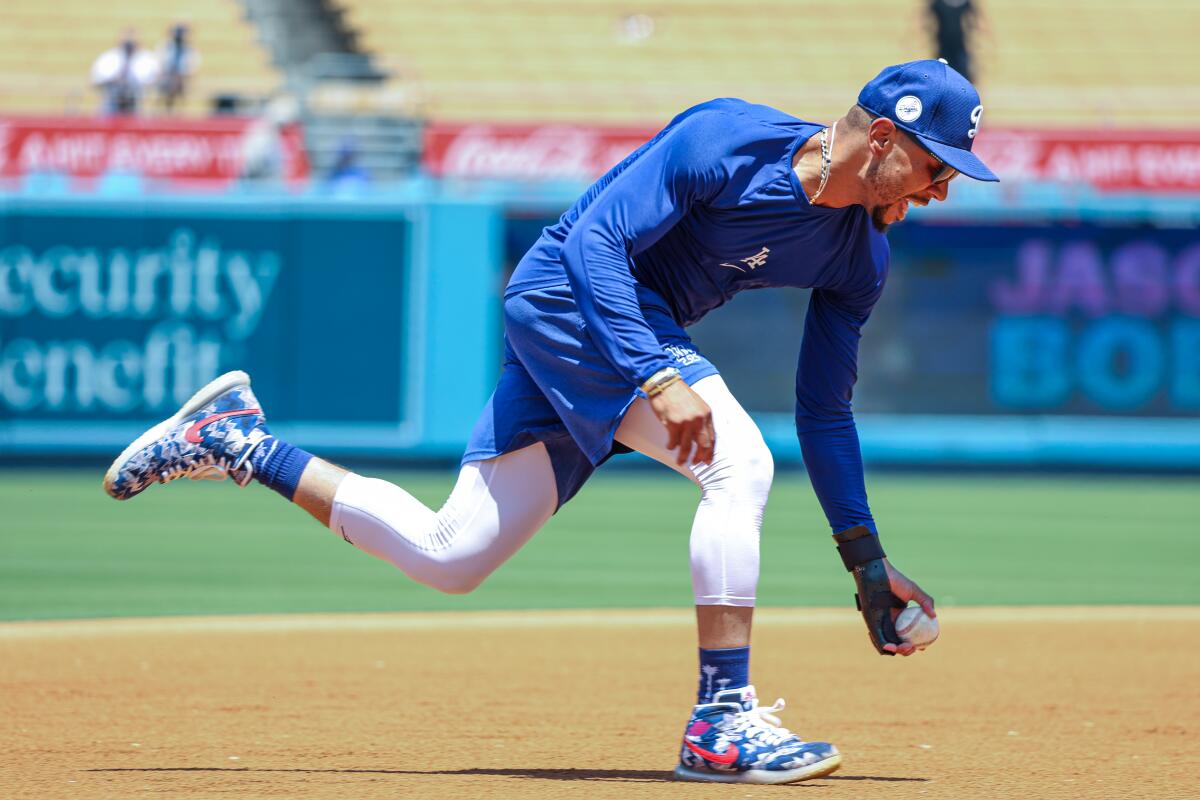
He wasn’t responsible for the injuries that were the impetus for his move to second base. He certainly wasn’t responsible for the misguided assumption that Lux could be an adequate shortstop, which inspired his latest position switch.
If Betts has come to prefer the infield, the Dodgers can only blame themselves for constructing rosters that required him to switch positions. Betts has earned the right to do what makes him most comfortable. He has to do whatever he feels is necessary to produce offensively.
Roberts didn’t think that would be a problem, however.
“When he did play different positions, last year, for example, he had one of his best years,” Roberts said. “So I don’t think … playing two different positions affects Mookie because, using his words, when he plays defense, he plays defense, and when he’s in the box, he’s focused on hitting.”
Provided it wouldn’t adversely affect Betts as a hitter, returning to right field could allow the Dodgers to best maximize their roster.
Before his injury, Betts was a below-average shortstop, which was understandable considering the last time he played there regularly was in high school. The six weeks he’s missed figures to have set him back. Ahmed, the team’s current fill-in, has won two Gold Gloves at the position. Sidelined Rojas is also a premium defensive shortstop.
Even if the shortstop experiment is finished for the season — Betts could try again next season after spending an entire winter working out at the position — what about second base? There, the Dodgers have Lux, who is hitting over .400 in his last 15 games. With how feeble the bottom of the order has looked at times, they’d prefer to not remove his left-handed bat from the lineup.
Jack Flaherty talked to reporters before Wednesday’s game for the first time since joining the Dodgers.
Newly acquired Kevin Kiermaier is a top-level defensive center fielder, and Edman can also play center field, which could push rookie Andy Pages into a platoon role in right field with Jason Heyward. Corner outfielders are expected to hit, and Pages and Heyward haven’t done much of that lately, which is why Betts might best fit there.
“Mookie told me time and time again, whatever it takes to make us the best ballclub, that’s what he’s willing to do,” Roberts said.
If the Dodgers decide that’s for Betts to play in right field, they’ll have to be mindful of how they approach him. They don’t want a player of Betts’ caliber to feel disrespected or feel as if he’s taken for granted.
Role players are important, but whether the Dodgers win the World Series will ultimately come down to their superstars.
To Shohei Ohtani.
To Freddie Freeman.
To Betts.
The special players will have to be special in October for the Dodgers to win, similar to how Betts and Corey Seager did the last time the team won a championship.
Betts has to position himself to perform like that, whether it’s in the infield or outfield. What’s best for him is also what’s best for the team.
More to Read
Are you a true-blue fan?
Get our Dodgers Dugout newsletter for insights, news and much more.
You may occasionally receive promotional content from the Los Angeles Times.

